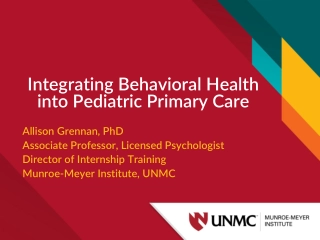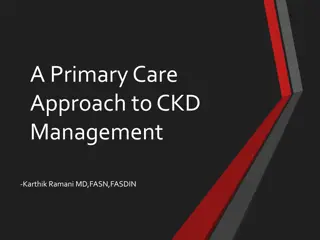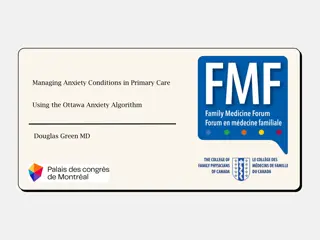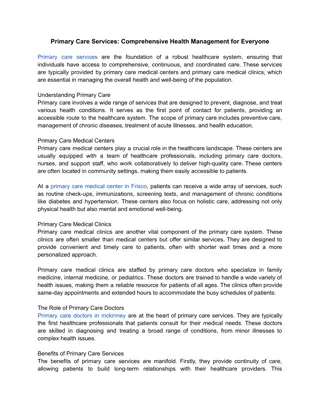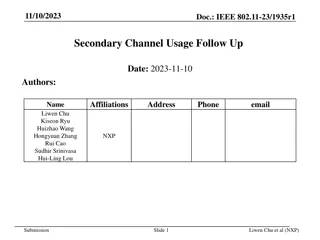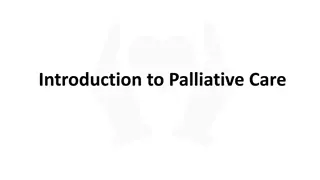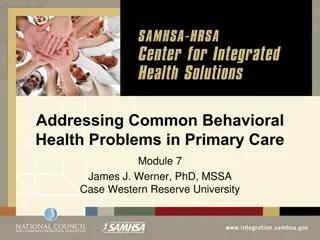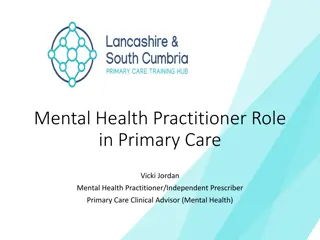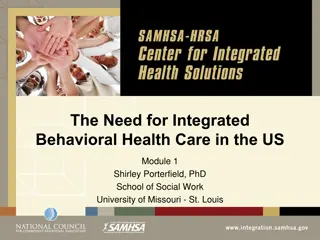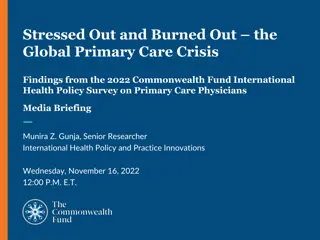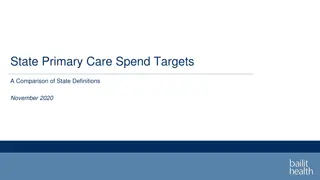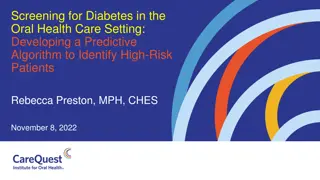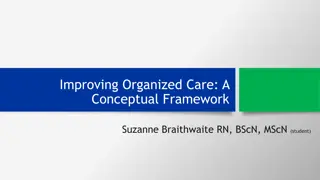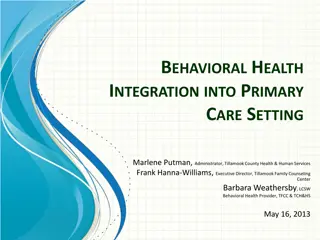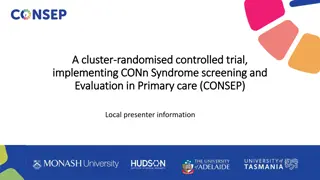Enhancing Care Management in Primary Care
Welcome to the webinar series by the Michigan Center for Clinical Systems Improvement featuring renowned speakers discussing care management, advance care planning, and transforming PCM practices. Learn from experts like Thomas Bodenheimer MD about population management and high-performing primary care.
Download Presentation

Please find below an Image/Link to download the presentation.
The content on the website is provided AS IS for your information and personal use only. It may not be sold, licensed, or shared on other websites without obtaining consent from the author.If you encounter any issues during the download, it is possible that the publisher has removed the file from their server.
You are allowed to download the files provided on this website for personal or commercial use, subject to the condition that they are used lawfully. All files are the property of their respective owners.
The content on the website is provided AS IS for your information and personal use only. It may not be sold, licensed, or shared on other websites without obtaining consent from the author.
E N D
Presentation Transcript
The Michigan Center for Clinical Systems Improvement welcomes you to our 3 part webinar series March 15 Tom Bodenhemier MD Maximizing Care Management; an emphasis on care/case management and health coaching May 3 John Fox MD & Carol Robinson DNP Advance Care Planning; why, how and the impact on Triple AIM June 6 L Gordon Moore MD Transforming PCMH Practices; new approaches involving measurement, accountability, and financing
Our speaker today Thomas Bodenheimer MD, MPH is a general internist who received his medical degree at Harvard and completed his residency at UCSF. He spent 32 years in full-time primary care practice in San Francisco's Mission District 10 years in community health centers and 22 years in private practice. He is currently Professor Emeritus of Family and Community Medicine at University of California, San Francisco and Founding Director of the Center for Excellence in Primary Care. He is co-author of Understanding Health Policy, 7th Edition, 2016, and Improving Primary Care, 2006 (both McGraw-Hill). He has written numerous health policy articles in the New England Journal of Medicine, JAMA, Annals of Family Medicine, and Health Affairs.
Disclosure Statement of Financial Interest I, Thomas Bodenheimer MD, MPH DO NOT have a financial interest/arrangement or affiliation with one or more organizations that could be perceived as a real or apparent conflict of interest in the context of the subject of this presentation.
Care management of patients with complex healthcare needs Thomas Bodenheimer MD Center for Excellence in Primary Care University of California, San Francisco Michigan Center for Clinical Systems Improvement March 15, 2016
The Building Blocks of High- Performing Primary Care Annals of Family Medicine 2014;12:166
Building Block 6. Population management: stratifying the panel Panel Management: Panel Management: Ensuring that ALL of the patients in our panel get recommended preventive and chronic care
Population management: stratifying the panel Health Coaching: Health Coaching: Helping patients with less complex chronic conditions to improve their self-management skills.
Population management: Stratifying the panel Complex Care Management: Complex Care Management: Targeted, team-based management for patients with complex healthcare needs
Care coordination and care management Care management assists patients/families to live with their chronic conditions through patient education, health coaching, medication management Requires licensed personnel Care coordination ensures that Specialists, hospitals, labs, pharmacies, home care agencies the medical neighborhood -- are available to primary care patients, and Primary care and the medical neighborhood share information in a timely manner Mainly done by non-licensed personnel Care coordination is an important part of complex care management: making sure patients can navigate the confusing health system Complex care management is team-based care management for complex patients to 1) improve health and 2) reduce the need for expensive services.
The confusing health system PCP
Care coordination or care management? Referral coordinator in primary care practice checks with a health plan to see if it has approved a CT scan for a patient. A social worker has a discussion with a high-utilizing patient about alternatives to calling 911 Spanish-speaking MA goes to specialist visit with Latino patient to translate RN discusses alternatives to using opioids for a chronic pain patient and offers substance use referrals MA uses a referral log to contact specialists who have not returned consultation reports to see if the patient attended the appointment and to get the report MA health coach engages a patient to discuss medication adherence
Care management for patients with 1 2 chronic conditions Systematic review of 41 studies of patients with diabetes: planned visits with nurse care manager was associated with improved outcomes1 Meta-analysis of 66 studies of quality improvement strategies for patients with diabetes Team-based care Planned visits by nurses or pharmacists The planned visits provide health coaching (self-management support) Best results when RN or pharmacist (using standing orders) makes medication adjustments without awaiting physician authorization2 1. Renders et al. Diabetes Care 2001;24:1821. 2. Shojania, JAMA 2006;296:427. The most effective strategies
Health Coaching: Engaging Patients and Families in Their Care
What is health coaching Paradigm shift: From: Doctor (or nurse) tells patient what to do and calls them non- compliant if they don t do it To: Engaging patients to learn their goals and what they are willing and able to do; meeting them half-way Health coaching assists patients to gain the knowledge, skills, and confidence to become informed, active participants in managing their chronic condition [Ghorob, Fam Pract Management, May/June 2013] Health coaching is: 1. A function everyone should do 2. A job that a few people should be trained in and have time for The 2 key components of care management are health coaching and medication management
Health Coaching Evidence RCT: patients with diabetes, hypertension and/or hyperlipidemia with medical assistants trained as health coaches had significantly improved A1c and LDL- cholesterol compared with non-coached patients1 In a RCT of low-income patients with poorly controlled diabetes, patients with peer health coaches (other patients with diabetes) had significantly improved A1c levels compared with controls2 1) Willard-Grace, Ann Fam Med 2015;13:130; 2) Thom et al, Ann Fam Med 2013:11:137.
Health coaching skills and evidence Curriculum, tools, videos at cepc.ucsf.edu Engaging patients by asking what they think and what are their goals is associated with better outcomes than telling patients what to do1 Ask-tell-ask Diabetic patients who know their A1c and their A1c goal have better control than a control group2 Know your numbers Close the loop (teachback) 50% of patients leave the medical visit without understanding their care plan. Diabetic patients whose care team closes the loop have better A1c levels3 Counseling on medication adherence The more actively a patient is involved, the better the adherence4 1) Heisler et al, JGIM 2002;17:243. 2) Levetan et al, Diabetes Care 2002;25:2. 3) Schillinger et al, Arch Intern Med 2003:163:83. 4) Osterberg, Blaschke, NEJM 2005;353:487.
Health coaching skills and evidence: action plans Action plans are agreements between a health coach and patient specifying a behavior change that the patient has chosen to make Patients with diabetes randomly assigned to traditional patient education or goal- setting with action plans The group doing action plans had significant reduction in HbA1c compared with the patient education group, whose A1c did not change Naik et al, Arch Intern Med 2011;171:453
Wisdom from Kate Lorig RN, PhD The founder of evidence-based health coaching Stanford Patient Education Research Center If you are confident you can do something, you probably can do it. If you are not confident, you probably can t.
Average per capita spending by number of chronic conditions (2004) $18,000 $16,819 $16,000 $14,000 $12,000 $10,091 $10,000 $8,000 $7,381 $6,000 $5,062 $4,000 $2,753 $2,000 $994 $0 0 1 2 3 4 5+ Number of chronic conditions Anderson, Chronic conditions Johns Hopkins, 2007
Complex care management Care management for patients with complex health care needs Reducing total costs Improving health and quality of life What are the goals? Team of RN, SW, pharmacist, health coach/patient navigator Who does complex care management? RN or SW alone, about 50 RN + SW + health coach/patient navigator, perhaps 200 What are the case loads? Because it takes a lot of resources, who are the best patients to target? What does the team do? What are some complex care management models?
Who needs CCM? Multiple chronic conditions Frequent hospitalizations, high costs Many prescription medications Many care providers, requiring care coordination Limitations of ADL Most are patients with CCM is intensive, costly process requiring highly skilled personnel Too healthy (i.e., low risk for hospitalization and excessive costs) Too sick to benefit It shouldn t be offered to patients who are
How select patients for CCM? Health plan high-risk lists (e.g. those with 2 or more hospital admits in past year, or high risk score) Hx of costs over 2-3 years, number of dx s, number of rx s, depression, self-mgm skills, social isolation Opinion of PCP and primary care team Need both; they are never the same After identifying patients, RN discusses with patient/family to see if they agree to engage Hong C et al. Caring for High-Need, High-Cost Patients: What Makes for a Successful Care Management Program? Commonwealth Fund, August 2014
Key components of complex care management (CCM) Team assesses what the patient needs Team develops care plan with patient, family, physicians Team teaches patient/family about diseases, symptoms Close the loop Know your numbers Medication adherence counseling Action plans Team uses health coaching techniques Team coaches patient/family on yellow flags, red flags Team tracks how patient is doing over time, revises care plan as needed
Payment for complex care management Pays face-to-face visits with physicians, NPs, PAs Teams are an expense, not a revenue source The dysfunction of fee-for-service PCMH payments Pay-for-performance Fee-for-service add-ons Capitation Global budget, usually in an ACO Shared savings from reducing hospitalizations in an ACO Alternative payment models
Payment for complex care management: Medicare s new care management fee CPT code 99490: physicians, NPs, PAs, clinical nurse specialists Eligible patients: 2 or more chronic conditions that increase risk of death, exacerbation, or functional decline Care plan: problem list, goals, symptom management, medication management, care coordination Provider/team accessible 24/7 Lots of work, fee about $45 once a month Complex care manager, 100 patients/month: $54,000. Many practices find the amount of work to be greater than the amount of payment
Some complex care management models Health Plan Model: Health plan employs CCM team, mainly telephonic Hospital Discharge Model: Transition from inpatient to home Primary Care Model: CCM team embedded in one or more primary care practices aICU Model: All care provided by separate high-risk clinic or high-risk team, patient leaves PCP ED Model: Emergency Department-embedded team provides CCM Home Care Model: Care entirely in patient s home Housing First Model: Homeless or precariously housed people receive stable housing with social services Community-Based Model: Care provided where patients are Bodenheimer T, Berry-Millett R. Care Management for Patients with Complex Healthcare Needs, Robert Wood Johnson Foundation, 2009; Bodenheimer T. Strategies to Reduce Costs and Improve Care for High-Utilizing Medicaid Patients: Reflections on Pioneering Programs. Center for Health Care Strategies, October 2013.
Health plan model: CareOregon Medicaid managed care plan Health resilience specialists are hired by the health plan and embedded in primary care practices Masters degree in social work or psychology Experience in community work and addiction Physical disease (COPD, CHF, HBP, diabetes Mental health issues Addiction, mostly opioids and alcohol Most patients have 3 issues Patients seen in clinic, at home, in community settings; are accompanied to specialist and community referral sites. Not just telephonic care management Help navigate health and social service systems Motivational interviewing Health literacy education Self-management skill development In addition to building trust, the health resilience specialists Supervised by RN, behaviorist, pharmacist All meet weekly for to discuss difficult cases
Hospital discharge model: Care Transitions Intervention Coleman et al, Arch Intern Med 2006;166:1822 RNs trained as transition coaches to teach patients/familie s skills to care for themselves 1 hospital visit, 1 home visit post-discharge, 3 post- discharge phone calls Significantly lower readmission rates and lower hospital costs compared with controls
Primary care model: patients stay with PCP Geriatric Resources for Assessment and Care of Elders (GRACE) Counsell et al, JAMA 2007;298:2623 NP/SW care management team working with PCPs and geriatrician Extensive training of care management team In-clinic, home and phone contacts Higher-risk subgroup: lower ED/hospitalization rates year 2, lower total costs year 3 compared with controls Small case load for care management team
Ambulatory intensive caring unit (aICU) model Complex patients cared for by separate high- risk clinic (aICU) with a team of physician, RN, SW, perhaps pharmacist, health coaches If patients have PCP, they leave PCP; most are satisfied because the aICU provides much more care and is accessible Primary care physicians often happy that complex patients leave for the aICU because these patients take a lot of time Rather than a separate aICU there might be a high-risk team in the primary care practice; patients leave their PCP to be on that team
aICU hybrid Separate clinic/team with CCM team including physician Patient s PCP RN-led CCM team + Hybrid: patients choose CCM in aICU or stay with PCP Keep PCP Leave PCP aICU RN spends part-time at aICU and part-time care- managing patients in primary care Patient chooses
aICU hybrid model: Stanford Coordinated Care Separate clinic only for complex patients Patients can choose to stay with PCP or leave PCP and receive all care at Stanford Coordinated Care aICU team is 3 MDs, RN, LCSW, pharmacist, physical therapist/chronic pain expert, 3 care coordinators RN goes to practices of patients keeping their PCP Care coordinators are health coaches, join visit as scribe, post-visit and between- visit to ensure understanding, set goals, teach yellow/red flags, help patients navigate the system, go with patients to specialists
aICU hybrid model: Stanford Coordinated Care Multiple clinical measures (like A1c, BP), functional measures (ADLs), utilization measures (ED visits, admits), and patient experience measures Metrics on big wall chart with red/yellow/green dots (red=bad, green=good). Goal: get the red out CCM team meets to discuss patients, see if improvement or not on the red/yellow/green wall chart Early data: ED visits down 39%, hospital admits down 25%. Patient and staff satisfaction 99%, HEDIS quality measures 99th percentile
Across all these programs, what works? Most critical is health coaching: teaching patients/families/caregivers how to self-manage their conditions
Health coaching for complex patients Coaching of complex patients is both similar and different from coaching of less complicated patients When you separate out the problems of a complex patients, each problem is not so complicated; complexity is the interaction of multiple problems. A care plan and action plan can be created for each of the separate problems Example: Diabetes: care plan is lifestyle change and titrating medications Osteoarthritis: care plan is physical therapy, exercise program, anti-inflammatory medications Domestic violence: meet with social worker to make definitive care plan
Health coaching for complex patients Reducing hospitalizations is both a cost outcome and a quality outcome Best way to reduce hospitalizations is teaching yellow and red flags. Example CHF: increased shortness of breath, edema, or 3 pound weight gain are yellow flags. Coaching teaches 1) weigh yourself daily and if weight up 3 pounds, call care team or take extra furosemide 2) Reduce salt intake 3) Take medications faithfully
Take-home messages Panel management Health coaching Complex care management Population-based care includes Care management includes patient education, health coaching and medication management Health coaching assists patients to gain the knowledge, skills, and confidence to become informed, active participants in their care Health coaching is essential for all patients with chronic conditions Patients with 1 or 2 conditions Patients with multiple conditions and complex healthcare needs Gradually, we are learning from experience how to care for patients with high costs and complex healthcare needs
Thank you for improving health care for the people of Michigan
Reminder CME and SW CE To obtain your continued education credits please complete and return the evaluation form emailed to you Include your name in the attestation request on the form Return the form to Kristen.gildner@miccsi.org or fax to 616.608.4058 If you did not receive the evaluation please email Kristen at the email address above.


